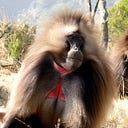Hi Elle,
Nice article!
Although, not sure whether I would classify bonobo society as matriarchal. The correct word would be co-dominance, with the observation that in natural settings male bonobos have more power than in unnatural settings such as zoos. The thing about bonobos is that they have very rarely actually been studied in the wild, in comparison to chimps. Most of our data comes from them being observed in zoos or through the use of food to attract them.
Here is an excerpt from a story in Smithsonian Mag:
"Bonobo researchers no longer lure their subjects with sugar cane. In fact, Ihomi says, some scientists point out that Kano observed bonobos in an unnatural situation. Normally, bonobos eat leaves and fruit, and there's plenty to go around. But enticed into the sugar cane field, the animals were out of their treetop habitat and competing for a concentrated resource. By watching bonobos in more natural settings, Ihomi and others have discovered that females are not necessarily as dominant as they appeared in the sugar cane field. "The alpha male is usually in charge," Ihomi says. The alpha male determines where the troop eats and sleeps and when it moves, and he is the first to defend the troop from leopards and pythons. But bonobo society is still much less authoritarian than that of other great apes. "If the alpha female doesn't want to follow him, she sits there and then the rest of the troop follows her lead and don't move," Ihomi says. "She always has the last say. It's like the alpha male is the general and the alpha female is the queen.""
https://www.smithsonianmag.com/science-nature/the-smart-and-swinging-bonobo-134784867/
I think that if bonobos were studied as extensively as chimps in natural setting, more of their violent impulses would come out. Chimps also behave differently in zoos and unnatural settings. One of the critiques of de Waal's studies is that they are based on observations of chimps in zoos, and not actually in the wild.
Anyways, that was just a side-note, but what you point out in your article is pretty much correct. An alpha is just a leader, the top spot in a dominance hierarchy, and this can be achieved in different ways. Although in the wild, size and intimidation does help a great deal in that.
I actually also wrote a piece on animal politics and the different ways chimpanzees achieve alpha status (as in top leader).
